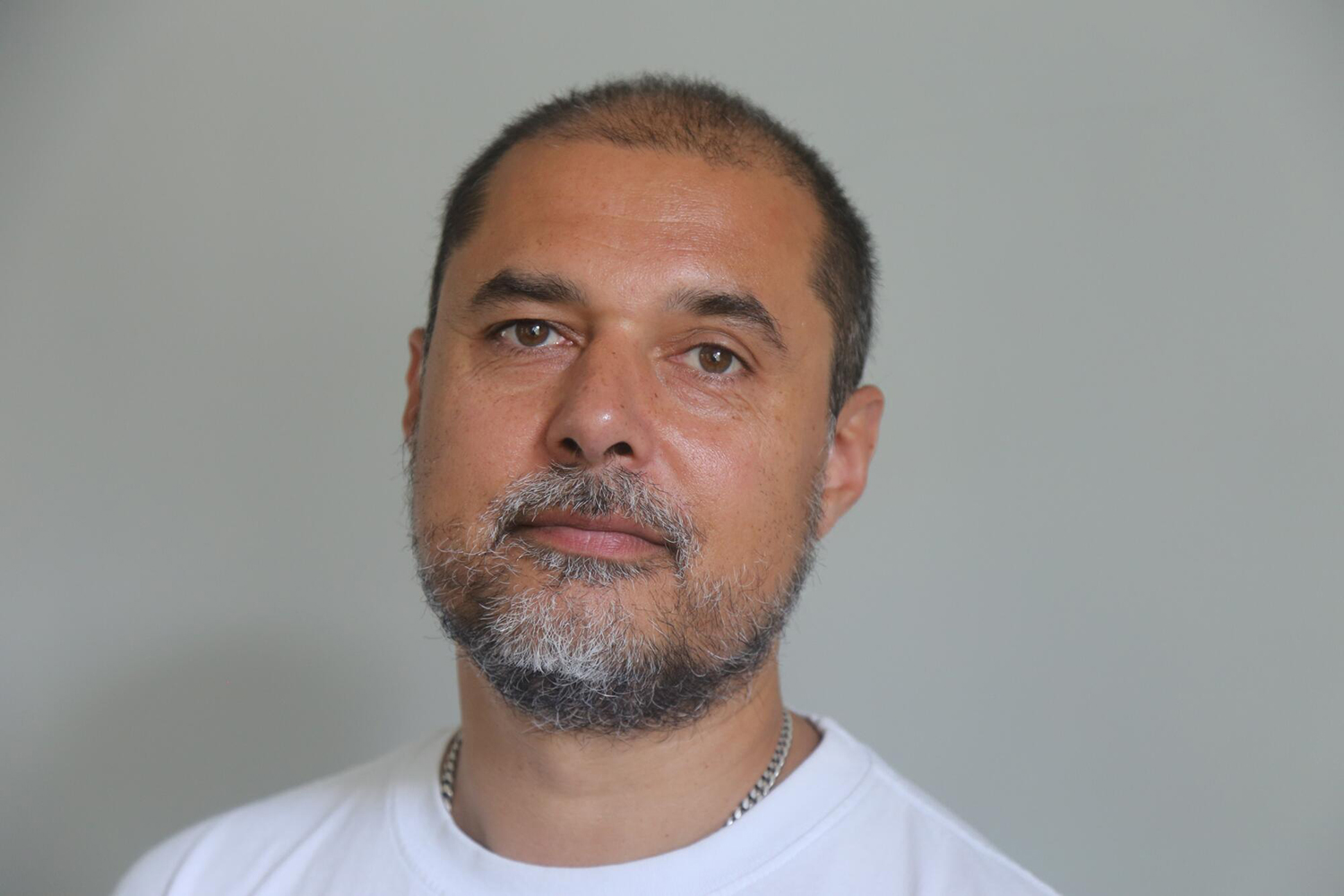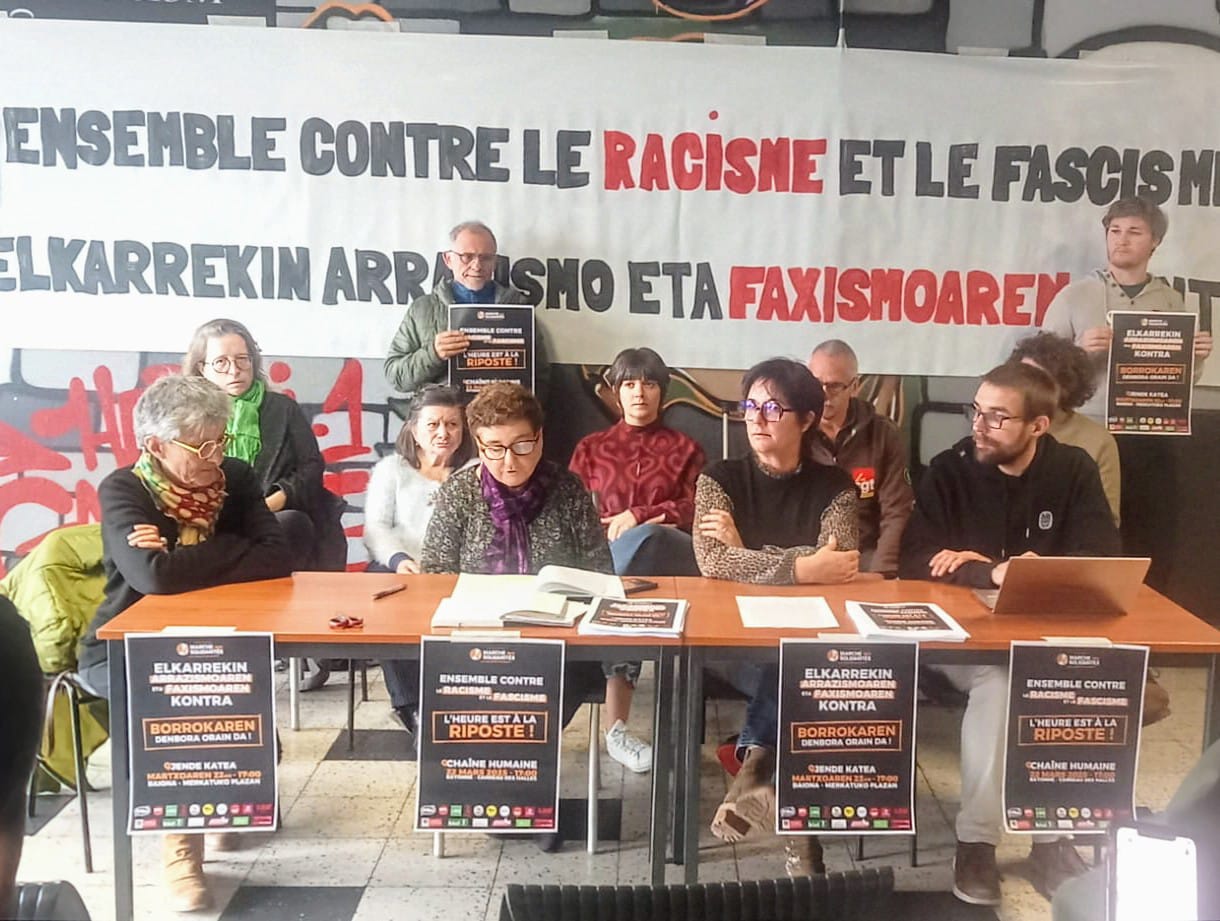Pictures of Arun Kundnani: "Racism has to do with the distribution of resources in society"
- The militant and anti-racist researcher points to a clear starting point: the fight against racism is not a psychological or discursive task, but the urgency of dismantling structures.

He is a writer and activist. Arun Kundnani (London, 1971) has been involved in anti-racist movements since his youth. His mother is from the Netherlands and his father is from India during the British colonialism. He was educated to listen to conversations about anti-colonial movements. He has also guided his academic career accordingly and has been a doctor in London. In the summer of 2024, Katakrake brought his book What is Antiracism and Why It Means Anti-Fascism to Spanish.
What is anti-racism today and why is it anti-capitalist?
There is a clear distinction between two forms of anti-racism: liberal and radical. In liberal anti-racism, the problem is essentially explained as a matter of irrational attitudes. Therefore, they suggest that an “educational campaign” is needed to combat these irrational attitudes and prejudices. White people need to study their own unconsciousness, rethink their prejudices, and question them. The idea is this: if we expose these individual tendencies that we have in mind, the whites would abandon these attitudes and, as a result, racism would somehow disappear.
This could have been useful until the 1960s as a method to combat racism. Since then, some of the racist systems we have in our country don’t need many white people to have racist attitudes, consciously or unconsciously. The force of racism is not found in belief systems, but in systems of markets and violence that divide resources in certain ways; with regard to the latter, it is justified in the name of apparently racially neutral problems such as crime, migration, terrorism and drugs. Today, the entire system can function without the racist attitudes or beliefs of individual people. That is why we need to think on a structural level.
"The strength of racism is not in belief systems, but in market systems and violence that divide resources in certain ways"
This is, therefore, what the radical anti-racist approach raises.
It comes especially from the struggles against colonialism in the twentieth century and the central idea of this tradition is that you cannot solve the problem of racism on the basis of individual attitudes. You have to study the structures to be able to change the power systems. It requires collective action, the construction and organization of collective power. At the same time, the form of racism today is not what it was a hundred years ago. We cannot fight with the tools we would have used a hundred years ago, we would not succeed. We are facing structures that have taken root in the last 50 years. Of course, some elements have been adapted to the current context throughout the history of slavery, but we need to focus on the particular form of slavery today. This requires us to think and understand the kind of capitalism, the kind of neoliberalism, etc. that we have today.
How do you explain the systemic nature of racism in the 21st century?
Racism has to do with the distribution of resources in society. In capitalist society, especially in the neoliberal order on which the free distribution of resources is based, this itself becomes the main form of the development of racism. It operates through the unequal distribution of resources and this profoundly incorporates the inequalities of racism into the fabric of society. Moreover, this order of neoliberalism does not get the support of people all over the world and must be imposed by force.
This system classifies many people as “leftovers”, with the result that millions of people – especially in the Global South – are always excluded from the economy of capitalism. In this context, racism becomes the instrument for managing and controlling these surplus populations and the mechanism for maintaining the order of neoliberalism. The limits are, for example, an infrastructure for this. Its purpose is to ensure that people on the periphery do not get into the heart of the system and allow imperialist exploitation of workers on the other side of the border. The entire system is legitimized through “anti-terrorism” and “anti-drug” speeches.
Anti-Islamic racism is indispensable in the war against terrorism. How does it materialize today and become a broader program of cultural changes implemented through violence?
Anti-Islamic racism is different in the United States, Britain, or parts of Europe. To begin with, there are those who think that anti-Islamic racism is based on a hatred that goes back thousands of years, but that has no coherence over the centuries. Also, it cannot be thought of as a spontaneous reaction to 9/11 or terrorism. It comes first. In the United States, it comes with neoliberalism developing in the 1970s and the representation of Arabs as people who are culturally incapable of adapting to this new modernity. This idea is central to anti-Islamic racism. Arabs are thought to be “hooked” on their traditions, believing that cultural traditions make them deficient to adapt to an international that is based on the market system. Due to cultural deficiencies, the rationality of neoliberal modernity must be forcibly imposed on them. This justifies violence. And, of course, this is related to the situation in Israel and Palestine right now.
"The purpose of the borders is to allow the imperialist exploitation of workers on the other side"
A liberal project involves both the celebration of cultural diversity and the reformulation of racism. To what extent is it problematic to start struggles from our identities or to place them at the center?
Identity is a starting point, but not a destination. There is never a homogeneous working class, there will always be a differentiated working class. Being oppressed or exploited within capitalism implies a specific location related to identity. There are two concepts of identity. The first is based on the absorption from birth of certain cultural norms that do not change throughout life and define who you are. This idea of identity will always be conservative. In fact, it suggests that a person’s political liberation comes from seeing his identity expressed in markets and political systems. The system can do this very easily; it can offer you products in the market that reflect the idea of this cultural identity and give you representation in political and cultural institutions. As Franz Fanon said, this “cultural celebration” is an attitude that fully benefits the system.
According to the other interpretation, identity is something that is built through collective struggle together with other people. The Black Power movement is a good example. They rejected the old identity of the concept of “black”—when blacks were socialized as servants in a system—and redefined blackness, precisely linked to the other struggles that were taking place in the world (linked to the liberation of the Vietnamese, to the liberation of the Puerto Rican population, etc. ). Today, this idea of identity has a more radical, anti-capitalist force, with a greater capacity for struggle. It questions the whole system.
"With the defense of purity, you kill culture and become a mere slogan to mobilize political results"
Racist outbursts are becoming more and more evident, even in the Basque Country. There are signs of a reactionary rise, and although it is not general, there are those who want to maintain the Basque identity from purity.
This is only possible when we talk about identity from conservatism; that is, when we understand it as something that cannot be changed. However, in reality, identities are always in motion. These movements occur through communication with others, just as human beings grow through our relationships with others. If you take the approach of this defense of purity, you kill your culture and it becomes not something you really believe in, but a mere slogan to mobilize some political results. This reduces culture to a few objects, being a clear symptom of neoliberal policies: it constantly raises the question of whether the cultural structure of a people is adapted to the management of the social, political and economic system.
A collective force that will bring true liberation will be based on the dismantling of the structures of neoliberal capitalism. It's the only way. To this end, it is essential to look for ways to overcome the cultural differences imposed by racialized capitalism and to find unity. This unity cannot be based on a cliché idea, for example, that “we all belong to the same class and have a common interest waiting to be activated.” A true union must be built. It will not be based on a simple idea of class solidarity, but that is also necessary. Any focus on defending diversity in cultural policy will always be conservative, and there will always be a culture that supports the system.
Dirudienez, Euskal Herrian migrazioa arazo bilakatu da azken bi hamarkadetan. Atzerritarrez josi omen dira gure lurrak. Gure kultura arriskuan omen dago fenomeno “berri” horren ondorio. Lapurretak, bortxaketak, liskarrak… Bizikidetza arazo horiek guztiak... [+]
Trintxerpen hasi eta Donostian bukatu da hainbat kolektibok deitutako XXVIII. Arrazakeriaren Kontrako Martxa.
Arrazismoaren aurkako nazioarteko eguna kari, larunbat honetan 16 alderdi, kolektibo eta elkartek deia luzatu dute, Baionako Marengo eta Pannecau zubien artean giza kate bat osatzeko. Aniztasuna, elkartasuna eta giza eskubideen errespetua aldarrikatzera deitu dute,... [+]
Bilboko Arrazakeriaren Aurkako Asanblada Arrazakeria ez da eztabaidatzen, borrokatzen da. Ordena kolonialari sua! lelopean antolatu du mobilizazioa, Arraza Diskriminazioa Ezabatzeko Nazioarteko Egunean. Gizarte eta erakundeei "iragan esklabista eta koloniala"... [+]











